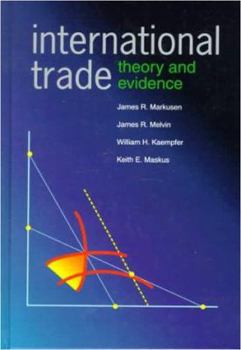International Trade: Theory and Evidence
Select Format
Select Condition 
Book Overview
Intended for International Trade courses at the undergraduate level. This book is suitable either as part of a two-term International sequence or in advanced courses in Trade that follow a one-term... This description may be from another edition of this product.
Format:Hardcover
Language:English
ISBN:007040447X
ISBN13:9780070404472
Release Date:November 1994
Publisher:McGraw-Hill/Irwin
Length:448 Pages
Weight:2.04 lbs.
Dimensions:9.3" x 1.3" x 6.3"
Customer Reviews
2 ratings
great text!
Published by Thriftbooks.com User , 22 years ago
We used this as a textbook for a one semester course in international trade relations. The writing is clear and the book is well-organized, making it very readable. It has very few errors, perhaps that's why a new edition hasn't come out lately. Most of the analyses of the models are done graphically and using only algebra, so it is suited for beginners of international trade theory/international economics. The questions at the end of each chapter vary from very easy to difficult, but the difficult ones can be answered after reading the text about two or three times and digesting its contents. This book is aimed primarily for undergraduates but first year graduate students can use this book as a review for more advanced texts in international trade such as "Lectures in International Trade",(1998) by Bhagwati et al. This textbook is highly-recommended and could be a better alternative than Krugman and Obstfeld's popular text ("International Economics: Theory and Policy").
Clear exposition - a good text
Published by Thriftbooks.com User , 24 years ago
This book can be used in the international trade component of a two-semester ug course in international trade and finance (as the editorial review points). The book uses - at least for me - an extremely useful approach to studying the rudiments of trade theory: after reviewing the standard concepts from consumer and producer theory, it provides a set of sufficient conditions that jointly determine the no-trade world. The core of the text then relaxes each of the mentioned conditions while keeping the others valid, showing why trade arises and at the same time providing a very clear overall picture. All models are discussed in a non-technical way but still with a fair amount of rigour, clearly stating the assumptions and proving the propositions. The idea of using the revealed preference to show the existence of gains from trade in various settings is defenitely sth worth examining.The trade policy part offers a chapter on strategic trade policy to shake the validity of the standard "trade barriers are harmful" belief from a perpective that is usually not presented by competitive texts.Still, two elements could be improved: the part on the link between trade and economic growth is not very readable. Maybe the authors could do sth more about it by using algebra. Secondly, although the concept of intra-industry trade is discussed on many occasions, the authors could consider devoting an additional chapter to it just to summarise the already mentioned ideas.To conclude: I consider the book as being better than, say, Krugman's or Salvatore's probably more popular texts.






